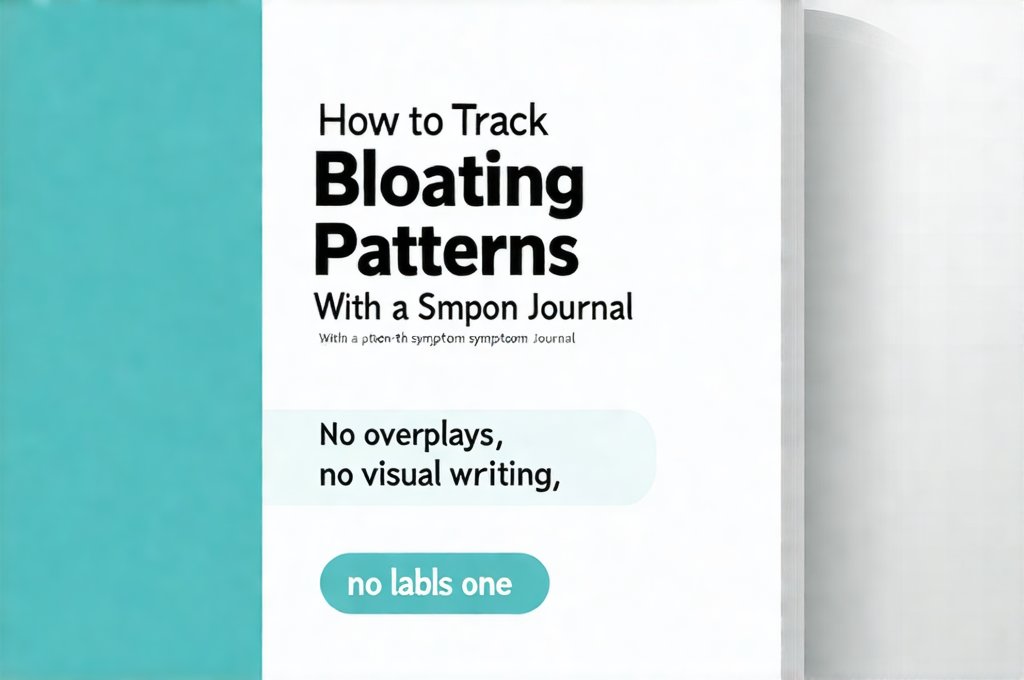Bloating is an incredibly common experience – one most people will grapple with at some point. It’s often dismissed as just ‘part of life,’ but persistent or severe bloating can be genuinely disruptive, impacting daily activities and overall well-being. Understanding why you bloat isn’t always straightforward; it rarely has a single cause. Instead, it’s frequently a complex interplay between diet, lifestyle, stress levels, hormonal fluctuations, and even underlying digestive processes. Many people attempt to address bloating with broad changes – eliminating entire food groups or relying on quick-fix solutions – but these aren’t always effective long-term.
The key to unlocking the mystery of your bloating lies in personalized observation and data collection. This isn’t about self-diagnosing; it’s about gathering information that can be shared with a healthcare professional to create a more targeted approach. A symptom journal, specifically focused on tracking bloating patterns, is an incredibly powerful tool for this process. It moves beyond guesswork and provides concrete evidence of what might be triggering your discomfort. This article will explore how to effectively track your bloating through journaling, outlining the essential elements, helpful tips, and potential insights you can gain from consistent recording.
The Core Components of a Bloating Symptom Journal
A successful bloating journal isn’t just about noting when you feel bloated; it’s about capturing a holistic picture of everything that might be contributing to it. This requires more than simply writing “bloated after lunch.” Think of yourself as a detective, gathering clues from all angles. The most effective journals incorporate several key elements: food intake, timing and severity of symptoms, bowel movements, hydration levels, stress & activity, and any relevant medications or supplements.
- Food Intake: Record everything you eat and drink – including portion sizes. Don’t underestimate the power of detail; even seemingly insignificant snacks can play a role. Be specific about ingredients when possible (e.g., “whole wheat bread” vs. just “bread”).
- Symptom Tracking: Beyond simply stating “bloated,” assess the severity of your bloating on a scale (e.g., 1-5, with 1 being mild discomfort and 5 being debilitating). Note where you feel bloated – is it in your abdomen, lower back, or elsewhere? Also, track associated symptoms like gas, cramping, changes in bowel habits, or fatigue.
- Bowel Movements: This might seem awkward, but recording the frequency, consistency, and any unusual characteristics of your bowel movements is crucial. Diarrhea, constipation, or altered stool appearance can all provide valuable insights.
Consistency is paramount. The more diligently you record this information, even when you’re not bloated, the better equipped you’ll be to identify patterns and potential triggers. A digital spreadsheet or a dedicated journaling app are helpful for organization and analysis, but a simple notebook works just as well. The important thing is to make it a habit. Consider how to track progress alongside your symptom journal.
Decoding Your Data: Identifying Potential Triggers & Patterns
Once you’ve been journaling consistently for a few weeks, you can start looking for patterns in your data. This is where the real value of symptom tracking emerges. Don’t expect instant answers; identifying triggers often takes time and careful observation. Start by comparing bloating episodes to your food intake. Are there specific foods that consistently precede bloat? Common culprits include: – High-FODMAP foods (garlic, onions, apples, pears)
– Carbonated beverages
– Artificial sweeteners
– Dairy products (if lactose intolerant)
– Gluten (if gluten sensitive)
However, don’t immediately eliminate entire food groups without further investigation. Food sensitivities can be nuanced and vary from person to person. Consider an elimination diet under the guidance of a healthcare professional if you suspect a specific food intolerance. Beyond food, examine your lifestyle factors. Does bloating tend to occur after periods of high stress? After intense exercise? Are there any correlations between hormonal fluctuations (menstrual cycle) and bloating episodes? Look for recurring themes – these are clues that point towards potential triggers. Remember, correlation doesn’t equal causation, but it does indicate areas worth exploring further. If you suspect food sensitivities, you might also find value in learning how to create a food reaction journal.
The Role of Hydration & Fiber in Bloating
Hydration plays a surprisingly significant role in digestive health and can directly impact bloating. Dehydration can lead to constipation, which in turn exacerbates bloating. Conversely, drinking excessive amounts of water during meals can sometimes dilute digestive enzymes, potentially causing discomfort. Finding the right balance is key – aim for consistent hydration throughout the day, but avoid large volumes of fluid during mealtimes.
Fiber is another double-edged sword. It’s essential for regular bowel movements and overall gut health, but too much fiber too quickly can actually lead to increased gas production and bloating. Gradually increase your fiber intake, allowing your digestive system time to adapt. Different types of fiber also affect people differently; soluble fiber (found in oats, beans, apples) tends to be gentler on the digestive system than insoluble fiber (found in wheat bran, vegetables). Pay attention to how different sources of fiber impact your bloating patterns. It’s important to maintain a balanced diet even when navigating digestive issues.
Stress & Gut Health: A Two-Way Street
The connection between stress and gut health is increasingly well-documented. Chronic stress can disrupt the delicate balance of your gut microbiome, leading to inflammation and digestive issues, including bloating. This isn’t just a theoretical concept; it’s why many people experience increased bloating during periods of high anxiety or emotional distress.
However, the relationship is two-way: gut health also influences mental well-being. An unhealthy gut can contribute to mood swings, anxiety, and even depression. Techniques for managing stress – such as mindfulness, meditation, yoga, or deep breathing exercises – can therefore have a positive impact on both your digestive system and your overall mental health. Note in your journal if bloating episodes correlate with periods of high stress and consider incorporating stress-reduction techniques into your daily routine. Learning to eat peacefully can also reduce the impact of stress on digestion.
Medications & Supplements: Don’t Forget to Track Them!
Many medications, both prescription and over-the-counter, can have side effects that contribute to bloating or disrupt digestive function. Antibiotics, for example, can significantly alter the gut microbiome, leading to imbalances and increased gas production. Similarly, certain supplements – such as iron supplements or magnesium – can cause constipation or diarrhea, potentially triggering bloating.
Carefully record all medications and supplements you’re taking in your journal, noting dosage and timing. If you suspect a medication is contributing to your bloating, do not stop taking it without consulting your healthcare provider. Instead, discuss the issue with them; they may be able to adjust the dosage or recommend an alternative medication. Also, remember that even seemingly harmless supplements can interact with medications, so it’s important to disclose everything you’re taking to your doctor. For families dealing with this, a kid-friendly food journal can be incredibly helpful. If you are on a specific diet, consider how to avoid bloating. And remember that you may also need to learn how to enjoy spices without discomfort.
It is vitally important to remember this information is for general knowledge and informational purposes only, and does not constitute medical advice. It is essential to consult with a qualified healthcare professional for any health concerns or before making any decisions related to your health or treatment.


















